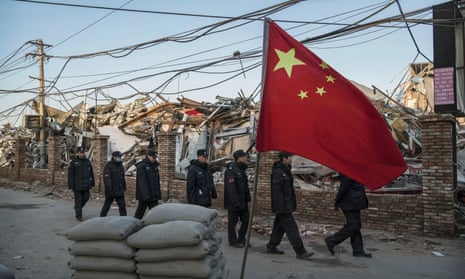Hundreds of protesters have taken to the streets of the Chinese capital to pillory Beijing’s crackdown on migrant communities with chants of “violent evictions violate human rights”.
Demonstrators gathered on the streets of Feijia village, about 12 miles northeast of Tiananmen Square, on Sunday for the small but rare rally condemning the eviction and demolition campaign.
Activists say thousands of migrant workers have been forced from their homes in Beijing’s rundown periphery since late November when authorities intensified efforts to drive “low-end” migrant workers out of the city in the wake of a deadly tenement fire.
Sunday’s protest was not reported in China’s Communist party controlled press but videos and photographs of the event spread online, with human rights campaigners cheering the scenes.
“The ‘low population’ is hitting back,” tweeted Yaxue Cao, the editor of ChinaChange.org, an English-language human rights website.
Footage showed crowds processing through the community, which is just north of the motorway leading to Beijing’s international airport and close to the 798 art district, itself the target of violent demolitions in the past. One group carried a white banner emblazoned with the phrase: “Baoli qugan qinfan renquan” - forced evictions violate human rights.
Eli Friedman, a Cornell University academic who studies China’s labour movement, said the protest – which coincided with the international human rights day – appeared to be the first since Beijing’s recent crackdown began. The demonstration suggested Beijing may have miscalculated how much outrage would be caused by the “ferocity” of its campaign, which has seen once vibrant migrant communities reduced to rubble.
Friedman, the author of a recent article about the evictions called Evicting the Underclass, predicted authorities would now move swiftly to ensure that the protest was nipped in the bud.
“They have a very well-developed apparatus for responding [to this kind of protest] ... They do some divide and conquer [among protest leaders], they make some compromises, they pay a few people off … they might arrest a few people or sometimes even beat a few people up… But usually their repression is pretty targeted - they don’t do mass arrests in most cases - and they make the problem go away.”
續上(二)北京,朝陽區,費家邨,低端人群上街示威,抗議被暴力驅趕,侵犯人權,我們不是低端人口,我們要站出來捍衞尊嚴。 今天是國際人權日,聚集的人群越来越多。✊ pic.twitter.com/8QszbWThDz
— 即管笑 (@xwh3ab) December 10, 2017
Friedman said it was certain that the protests would not be allowed to spread - particularly if they appeared to be contaminating “potentially politically explosive groups” such as students or the middle class. Even so, Chinese president Xi Jinping’s attempts to project himself as an all-powerful champion of China’s poor were likely to be undermined by the mass evictions.
During visits to affected communities last week, several victims of the crackdown directly - and unusually - pointed the finger of blame at Xi. “I think what is happening is that ... Xi Jinping has water in his head,” said one angry migrant from Anhui province.
Friedman said: “Given the scale people know that there is no way that [Beijing Communist party chief] Cai Qi or anyone in the Beijing municipal government would do something on this level without the approval of Xi Jinping.”
“It’s clearly been a terrible PR exercise.”
Additional reporting by Wang Zhen
